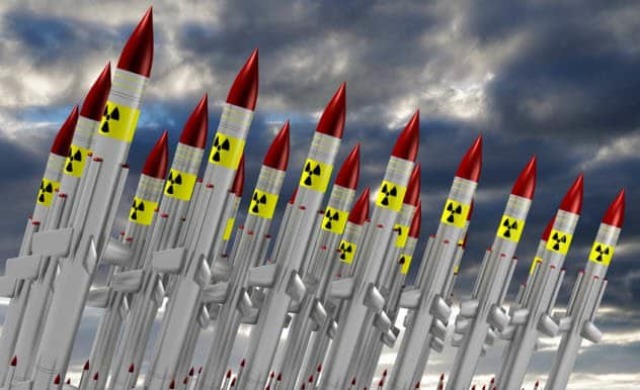A nuclear weapon is an explosive device that derives its destructive force from nuclear reactions, either fission or from a combination of fission and fusion real. Both bomb types release large quantities of energy from relatively small amounts of matter. The first test of a fission ("atomic") bomb released an amount of energy approximately equal to 20,000 tons of TNT . The first thermonuclear ("hydrogen") bomb test released energy approximately equal to 10 million tons of TNT . Nuclear bombs have had yields between 10 tons TNT and 50 megatons for the Tsar Bomba . A nuclear device no larger than traditional bombs can devastate an entire city by blast, fire, and radiation. Since they are weapons of mass destruction, the proliferation of nuclear weapons is a focus of international relations policy.
Nuclear weapons have been used twice in war, both times by the United States against Japan near the end of World War II. On August 6, 1945, the U.S. Army Air Forces detonated a uranium gun-type fission bomb nicknamed "Little Boy" over the Japanese city of Hiroshima. Three days later, on August 9, the U.S. Army Air Forces detonated a plutonium implosion-type fission bomb nicknamed "Fat Man" over the Japanese city of Nagasaki. These bombings caused injuries that resulted in the deaths of approximately 200,000 civilians and military personnel. The ethics of these bombings and their role in Japan's surrender are subjects of debate.
Since the atomic bombings of Hiroshima and Nagasaki, nuclear weapons have been detonated over two thousand times for testing and demonstration. Only a few nations possess such weapons or are suspected of seeking them. The only countries known to have detonated nuclear weapons—and acknowledge possessing them—are the United States, the Soviet Union, the United Kingdom, France, China, India, Pakistan, and North Korea. Israel is believed to possess nuclear weapons, though, in a policy of deliberate ambiguity, it does not acknowledge having them. Germany, Italy, Turkey, Belgium and the Netherlands are nuclear weapons sharing states. South Africa is the only country to have independently developed and then renounced and dismantled its nuclear weapons.
The Treaty on the Non-Proliferation of Nuclear Weapons aims to reduce the spread of nuclear weapons, but its effectiveness has been questioned. Modernisation of weapons continues to this day.

